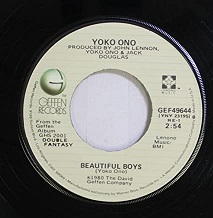Beautiful Boys
| "Beautiful Boys" | ||||
|---|---|---|---|---|
 | ||||
| Single by Yoko Ono | ||||
| from the album Double Fantasy | ||||
| A-side | "Woman" | |||
| Released | 12 January 1981 (US) 16 January 1981 (UK) | |||
| Genre | Rock | |||
| Length | 2:54 | |||
| Label | Geffen | |||
| Songwriter(s) | Yoko Ono | |||
| Producer(s) | John Lennon, Yoko Ono, Jack Douglas | |||
| Yoko Ono singles chronology | ||||
| ||||
"Beautiful Boys" is a song written by Yoko Ono that was first released on Ono's and John Lennon's 1980 album Double Fantasy. It was later released as the B-side of Lennon's #1 single "Woman."
The first verse of "Beautiful Boys" is directed at Ono and Lennon's young son Sean, culminating in the line "don't be afraid to cry."[1] On the album this comes off as a companion piece to Lennon's song "Beautiful Boy (Darling Boy)," which Lennon directed to Sean.[1] The second verse is directed at her husband John, with lines such as "your mind has changed the world."[1] Finally the last verse is directed at all men and she tells them not to be afraid to "go to hell and back" as they go through life.[1] Music critic Johnny Rogan sees this line as encouraging exploration and notes that the last line "don't be afraid to be afraid" serves as a "gentle warning."[2] Lennon said of this line:
I'm not afraid to be afraid, though it's always scary. But it's more painful to try not to be yourself. People spend a lot of time trying to be someone else.[2]
The last verse is sung over backward noises and sounds that give the verse an "uneasy atmosphere," according to music lecturers Ben Urish and Ken Bielen.[1] Urish and Bielen see the last verse as a response to "Woman," which in their view Lennon directed towards all women.[1]
Beatle biographer John Blaney also sees this song as a companion to "Woman" stating that "Ono's analysis of her relationship with Lennon was insightful and honest. It flattered and encouraged, expressing everything that a loving wife would wish for her husband."
In an interview with Playboy Ono said of the song that:
It is a message to men. John and Sean inspired me, but the third verse is about all the beautiful boys of the world. That's sort of like the extension of the idea. I had relationships with men, but it was always "You know where the door is." I didn't really trouble to find out what their needs were, what their pains were. With John, that changed. He found out my pain, and I had to find out his pain...The world consists of men and women—there is no denying that. It is important men and women recognize each other and work with each other. It's really a message to men—reaching out to men to understand.[3][8]
Keyboardist George Small stated that he regarded "Beautiful Boys" as the most
References
- ^ ISBN 9780275991807.
- ^ ISBN 0711955999.
- ^ ISBN 978-1-906002-02-2.
- ^ ISBN 0025539507.
- ^ Sowa, Tom (December 12, 1980). "The last ballad of John and Yoko". The Spokesman-Review. p. 2. Retrieved 2021-08-21 – via newspapers.com.
- ^ Holston, Noel (December 12, 1980). "Dialogue". The Orlando Sentinel. p. 16-E. Retrieved 2021-08-21 – via newspapers.com.
- ISBN 0517544938.)
{{cite book}}: CS1 maint: multiple names: authors list (link - ISBN 9781429958080.
- ^ ISBN 9781439103012.
